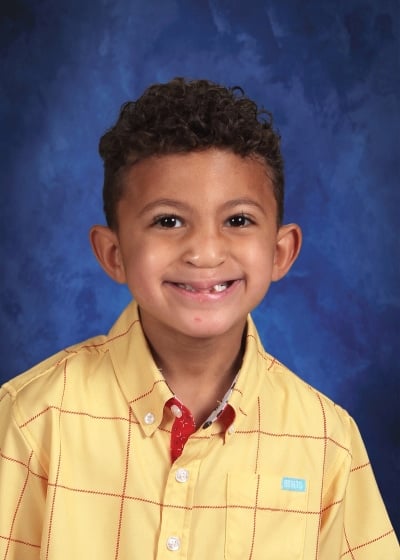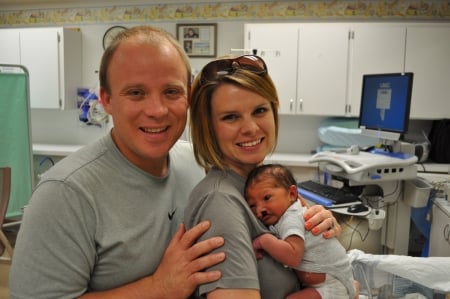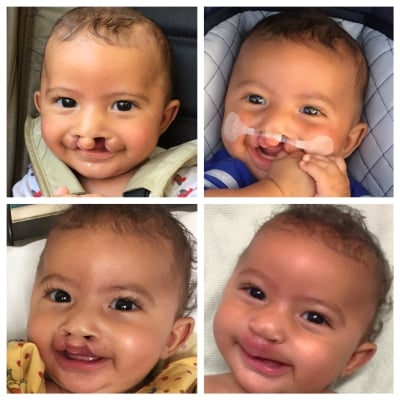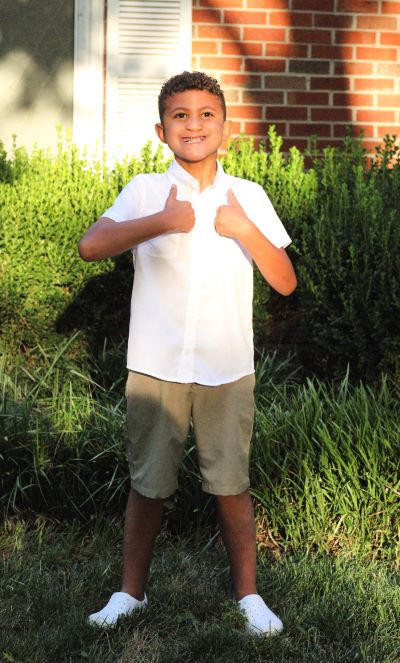Hartsfield Syndrome and Bilateral Cleft Palate: Hezekiah’s Story
Meet Hezekiah

Hezekiah is an 8-year-old with a huge imagination and strong opinions on music. (He’s currently very into ACDC’s “Thunderstruck” and A Goofy Movie soundtrack.) This snuggler is known for his loving spirit and insisting his favorite people, including his two older sisters and two older cousins, “Come sit by me.”
“He’s so creative,” said Hezekiah’s dad, Lee Waldron. “We have to make sure we’re on the right channel with his imagination because he’ll go from fishing to fighting off ninjas to being a robot. It’s hard to have a bad day with Hezekiah in it!”
“Hezekiah was born with a variety of special needs, but he’s really beginning to thrive, and Children’s Mercy has been a big part of that,” said Hezekiah’s mom, Sara Jo Waldron. She and Lee adopted Hezekiah at birth.
Hezekiah was diagnosed with Hartsfield syndrome, a very rare genetic condition with several linked symptoms. Hezekiah was born with no corpus callosum (a nerve bundle that connects the two sides of the brain) and some midline differences, including a bilateral cleft lip and palate and differences in his hands and feet. He also has diabetes insipidus: His body has a hard time balancing fluids because of a lack of the antidiuretic hormone (ADH).
“I have a journal from when he was little, and we went to 28 appointments in his first month of life,” said Sara Jo. “It was really overwhelming.”
Rare condition, collaborative care

At the time, the family was living in Hillsboro, Kan., 45 minutes north of Wichita, but they moved to the Kansas City area in late 2019 to be closer to their Children’s Mercy Kansas City care team. Before they moved, their care coordinator would schedule Hezekiah’s appointments in one- to two-day blocks to try to lessen their travel stress.
Hezekiah’s main care teams are Neurology, Endocrinology and the Cleft Lip and Palate Clinic. As an infant, Hezekiah’s most urgent need was for cleft lip and palate repair, but his pre- and post-operative care needed to be handled carefully to control his diabetes insipidus.
“If you don’t manage his fluids well, you can have brain swelling [and other complications],” said Shao Jiang, MD, Division Director, Plastic and Reconstructive Surgery. “Plastic Surgery is not an island; we surround ourselves with all the experts the hospital has. The pediatricians, the endocrinologist and neurologist, anesthesiologists, the PICU staff, social work, the feeding specialist, the nutritionist — all these people have to be intimately involved. Only in a tertiary pediatric care center such as Children’s Mercy could this be done safely and with a good outcome.”
Bilateral, or double, cleft is relatively rare (only 10 to 20 percent of all cleft patients are bilateral). Children’s Mercy sees a disproportionate number of bilateral cases because the hospital provides the complex care these patients require. The Cleft Lip and Palate Program has more than 4,000 active patients, with 100 to 150 new patients added each year.
“We had amazing experiences with everyone at Children’s Mercy,” said Sara Jo. “They are patient and gentle. Dr. Jiang and his whole team really know Hezekiah. The team cares about him as an individual and what he needs.”
One surgery at a time

Hezekiah had lip adhesion surgery when he was 2 months old and a lip repair surgery at 6 months. They waited for his first palate repair surgery because they wanted him to have time to grow. After getting a feeding tube, Hezekiah gained weight and was ready for his palate repair surgery at 18 months. Now that Hezekiah is older, they are preparing for a surgery to reconstruct his gum line and possible additional procedures down the line.
“Children’s Mercy has done a good job of telling us what his care will look like in the future, and we’ll cross that bridge when we get there,” said Sara Jo. “We deal with things as they come.”
“Every time we offer surgical options, it’s with the caveat that he needs to be maximized medically prior to surgery and post-operatively,” said Dr. Jiang, who emphasized the collaboration between all the divisions helping Hezekiah stay healthy.
“The Cleft Lip and Palate Program is housed in Plastic Surgery, but it involves almost every department in the hospital and the support of all these other dedicated professionals who participate in the care of these extraordinary kids,” said Dr. Jiang.
In addition to his bilateral cleft repair, Hezekiah has had two hand surgeries, one foot surgery and tubes placed in his ears several times.
“Plastics has been great about coordinating with other surgeons,” said Sara Jo. “If he had to have tubes put in his ears, they would coordinate together to have that happen at the same time as his other surgeries.”
One-of-a-kind solutions for one-of-a-kind Hezekiah
Hezekiah checks in with Dr. Jiang every nine to 12 months now and sees the Gastroenterology team once a year. He works closely with both Endocrinology, to manage his diabetes insipidus, and Neurology, as he continues to recover from a severe seizure caused by a sodium fluctuation in 2020. The Waldrons recently sought help from the GOLDILOKs® Clinic (the Children’s Mercy Pediatric Precision Medicine Clinic) to better understand how Hezekiah’s genetics affect his response to different medications.

It takes frequent communication between the Waldrons and Hezekiah’s team to manage his care. Waiting for his next appointment often isn’t a safe option, especially when dealing with quickly changing sodium levels.
“We’re so thankful for the [patient] portal because I can send a message and ask, ‘What do you recommend?’” said Sara Jo. “It makes it really practical to get it taken care of quickly.”
“The after-hour care line is always good, too,” said Lee. “We’ll get a call back within 30 minutes, and it expedites the resources we need.”
As Sara Jo and Lee look to the future, they feel confident that Hezekiah is in good medical hands.
“Children’s Mercy is a safe place for him,” said Sara Jo. “The advocacy I’ve done for my son has always been welcomed. I’ve been listened to — that goes from receptionists to lead surgeons.”
And the team at Children’s Mercy is very happy to get to keep hanging out with Hezekiah and his family.
“This kid is extraordinarily loving,” said Dr. Jiang. “He’s being raised by loving parents and that translates.”
